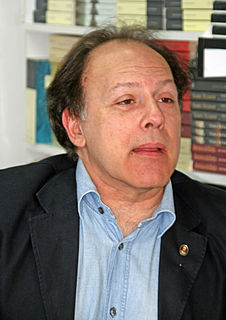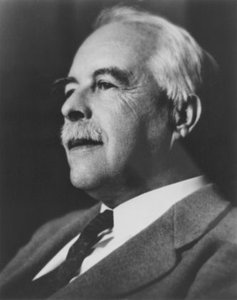A Quote by Justus von Liebig
There is in the chemist a form of thought by which all ideas become visible in the mind as strains of an imagined piece of music. This form of thought is developed in Faraday in the highest degree, whence it arises that to one who is not acquainted with this method of thinking, his scientific works seem barren and dry, and merely a series of researches strung together, while his oral discourse when he teaches or explains is intellectual, elegant, and of wonderful clearness.
Related Quotes
The moment our discourse rises above the ground-line of familiar facts, and is inflamed with passion or exalted thought, it clothes itself in images. A man conversing in earnest, if he watch his intellectual processes, will find that always a material image, more or less luminous, arises in his mind, contemporaneous with every thought, which furnishes the vestment of the thought.... This imagery is spontaneous. It is the blending of experience with the present action of the mind. It is proper creation.
There is a thinking stuff from which all things are made, and which, in its original state, permeates, and fills the inter spaces of the universe.
A thought in this substance, Produces the thing that is imaged by the thought.
Man can form things in his thought, and by impressing his thought upon formless substance, can cause the thing he thinks about to be created.
By consequence, or train of thoughts, I understand that succession of one thought to another which is called, to distinguish it from discourse in words, mental discourse. When a man thinketh on anything whatsoever, his next thought after is not altogether so casual as it seems to be. Not every thought to every thought succeeds indifferently.
[Fritz Haber's] greatness lies in his scientific ideas and in the depth of his searching. The thought, the plan, and the process are more important to him than the completion. The creative process gives him more pleasure than the yield, the finished piece. Success is immaterial. "Doing it was wonderful." His work is nearly always uneconomical, with the wastefulness of the rich.
The scientific method is the ultimate elegant explanation. It is the ultimate foundation for anything worthy of the name "explanation". It makes no sense to talk about explanations without having a process for deciding which are right and which are wrong, and in a broad sense that is what the scientific method is about. All of the other wonderful explanations celebrated here owe their origin and credibility to the process by which they are verified-the scientific method.
Music is the purest form of art, and therefore the most direct expression of beauty, with a form and spirit which is one and simple, and least encumbered with anything extraneous. We seem to feel that the manifestation of the infinite in the finite forms of creation is music itself, silent and visible.
Women stand related to beautiful nature around us, and the enamoured youth mixes their form with moon and stars, with woods and waters, and the pomp of summer. They heal us of awkwardness by their words and looks. We observe their intellectual influence on the most serious student. They refine and clear his mind: teach him to put a pleasing method into what is dry and difficult.
Developing the capacity for clear light dreams is similar to developing the capacity of abiding in the non-dual presence of rigpa during the day. In the beginning, rigpa and thought seem different, so that in the experience of rigpa there is no thought, and if thought arises we are distracted and lose rigpa. But when stabliity in rigpa is developed, thought simply arises and dissolves without in the least obscuring rigpa; the practitioner remains in non-dual awareness.
The readiness to sacrifice one's personal work and, if necessary, even one's life for others shows its most highly developed form in the Aryan race. The greatness of the Aryan is not based on his intellectual powers; but rather on his willingness to devote all his faculties to the service of his community.
The average mind requires a change of environment before he can change his thought. He has to go somewhere or bring into his presence something that will suggest a new line of thinking and feeling. The master mind, however, can change his thought whenever he so desires. A change of scene is not necessary, because such a mind is not controlled from without. A change of scene will not produce a change of thought in the master mind unless he so elects.
The branches of mathematics are as various as the sciences to which they belong, and each subject of physical enquiry has its appropriate mathematics. In every form of material manifestation, there is a corresponding form of human thought, so that the human mind is as wide in its range of thought as the physical universe in which it thinks.




































